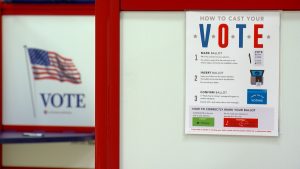Pritzker signs election bill to increase party power in primaries
By Andrew Adams Capitol News Illinois — July 10, 2024 Changes to primary election fundraising, the electoral college and the state’s voter registration database are now law after Gov. J.B. Pritzker signed a wide-ranging bill on Monday, July 1.
Changes to primary election fundraising, the electoral college and the state’s voter registration database are now law after Gov. J.B. Pritzker signed a wide-ranging bill on Monday, July 1.
The legislation, containing several unrelated election measures, passed near the end of the legislature’s spring session on a vote of 68-38 in the House and 51-3 in the Senate.
A measure loosening restrictions on political parties’ spending during primary campaigns sparked pushback from some House Republicans during debate of the bill.
Under the new law, parties will be allowed to transfer an unlimited amount of funds to candidates during primary elections. In previous elections, parties were limited in the amount of money they could give candidates based on the office they sought. That provision was put in place in 2009 as part of a reform campaign by then-Gov. Pat Quinn, who took office after his predecessor, Rod Blagojevich, was removed from office following a corruption scandal.
The measure comes after several primary elections earlier this year where House Speaker Chris Welch sided with challengers over incumbents of his own party. In the Senate, a party-backed candidate also lost their primary election. Appointed Sen. Natalie Toro, D-Chicago, lost to progressive challenger Graciela Guzman.
Critics, including campaign finance advocacy group Reform for Illinois, said the measure could lead to legislative leaders’ centralizing their power over lawmakers while also making elections more expensive.
Another provision in the bill would change how the state handles the electors it sends to the electoral college during presidential elections. Under the new law, electors — those who actually cast Illinois’ votes for president — would be required to vote for the presidential candidate that won the state’s presidential election.
Previously, electors were not legally bound to vote for the winner of the popular vote and could instead act as a “faithless elector,” casting their vote for another candidate.
While unprecedented in Illinois, several electors elsewhere have voted against their state’s winner in recent elections. In 2016, seven of the 538 electors successfully voted against their state’s winner. Three others also voted faithlessly, although their votes were invalidated.
Illinois law will require electors to sign a pledge to vote faithfully and, if they don’t, they would be immediately replaced with an alternate who also signed a pledge to vote in accordance with the popular vote.
The measure was based on model legislation that has been adopted in 12 other states. Illinois is now the 34th state that bars faithless electors. While some states impose a penalty while still counting the vote, Illinois will not count faithless electoral college votes.
The newly signed law also contains a provision crafted in response to a situation where voters’ home addresses and birthdays were published on a network of conservative websites.
Local Government Information Services, a company backed by conservative operatives Dan Proft and Brian Timpone, published voter information earlier this year and was quickly sued by Illinois Attorney General Kwame Raoul’s office.
The law now explicitly says that voter registration data cannot be used for “any personal, private, or commercial purpose, including, but not limited to, the intimidation, threat, or deception of any person or the advertising, solicitation, sale, or marketing of products or services.”
Proft was recently the subject of a Democratic Party complaint alleging he and his political action committee illegally coordinated with then-candidate for governor Darren Bailey. That complaint, the first such challenge to be considered by the Illinois State Board of Elections, was ultimately dismissed.
aadams@capitolnewsillinois.com
Capitol News Illinois is a nonprofit, nonpartisan news service covering state government. It is distributed to hundreds of print and broadcast outlets statewide. It is funded primarily by the Illinois Press Foundation and the Robert R. McCormick Foundation, along with major contributions from the Illinois Broadcasters Foundation and Southern Illinois Editorial Association.







